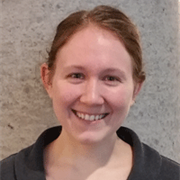Coral Wille is a new Assistant Professor in the Department of Genetics. She completed her PhD in Microbiology at the University of Wisconsin-Madison in the laboratory of Dr. Shannon Kenney.
There, she investigated how the pervasive human pathogen Epstein-Barr virus (EBV) co-opts host epigenetic machinery to regulate its lifecycle. She was the first to discover a mammalian virus containing the DNA modification 5-hydroxymethylcytosine, and moreover, how its dysregulation is a feature of EBV-mediated transformation.
Coral completed postdoctoral research in the laboratory of Dr. Rupa Sridharan (Wisconsin Institute for Discovery) where she elucidated how epigenetic modifications govern cell identity during somatic cell reprogramming to induced pluripotent stem cells (iPSCs). Her work focused on the enigmatic histone modifier DOT1L, the exclusive methyltransferase of H3K79. H3K79me2 is the most depleted histone modification in pluripotent stem cells as compared to somatic cells, and its reduction enhances reprogramming.
Despite the enrichment of H3K79me2 on the bodies of highly expressed genes, inhibiting DOT1L activity has minimal effects on steady-state transcription. Coral uncovered that removal of H3K79me2 enables a local gain of the activating modification H3K9ac, and nascent transcription. Her work demonstrates that cell specification can be regulated by epigenetic alterations outside of conventional regulatory elements.
Going forward, Coral plans to lead a vibrant lab using dynamic cell fate transitions as a model system to understand how identity is established and maintained. The Wille lab (https://sites.uab.edu/willelab/) will explore how the epigenome and transcriptome are interconnected, and how these networks determine developmental potential. Additionally, she will capitalize on her experience in cancer research to generate novel model systems of early transformation.
Coral is thrilled to work with students as they acquire skills in both traditional molecular assays and genome-wide bioinformatics. She values mentorship and the preparation of students for their future careers in genetics research. Coral also plans to be involved in undergraduate genetics education and graduate seminar series. She looks forward to developing collaborations across UAB to share skills and broaden her work.